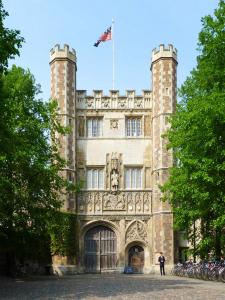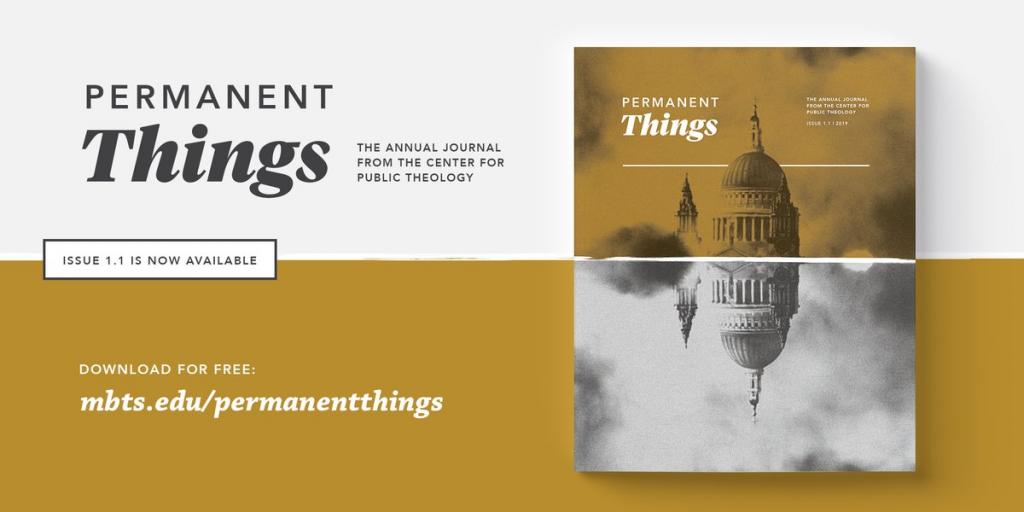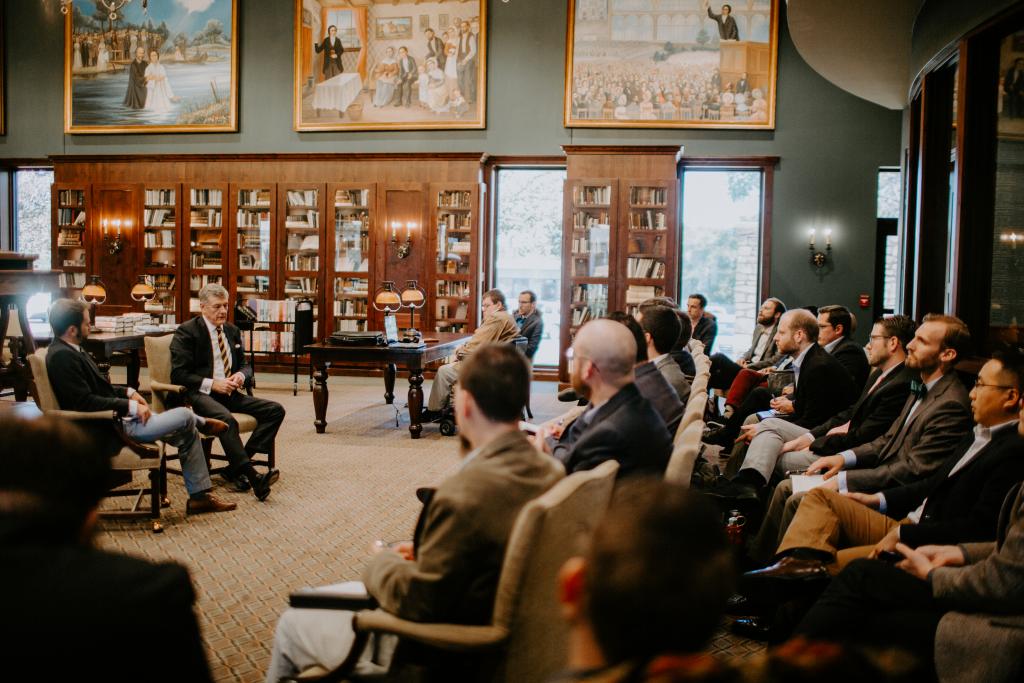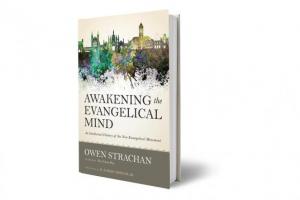 The greatest need of God’s church today is this: sound doctrine. Sound doctrine grows the sheep, blesses the church, warns the wolves, and glorifies the Lord. If this is true, then the greatest imperative of God’s church today is this: we need to train agents of sound doctrine. We need to produce a massive harvest of faithful theologians and pastors who will teach and preach sound doctrine.
The greatest need of God’s church today is this: sound doctrine. Sound doctrine grows the sheep, blesses the church, warns the wolves, and glorifies the Lord. If this is true, then the greatest imperative of God’s church today is this: we need to train agents of sound doctrine. We need to produce a massive harvest of faithful theologians and pastors who will teach and preach sound doctrine.
There are numerous ways to stimulate such a movement. Here is one: to invest deeply in the rising generation of scholars and pastor-theologians, and train them to think coram deo (unto God). This is not an easy work, though. We’re in an age when many seminaries, divinity schools, and religious institutions are flagging. Schools that once pulsed with vitality now struggle to stay in business. Hard decisions must be made in such instances; does the school retrofit its degree programs, orienting them in a broadly social identity? Should schools focus on “spirituality” instead of doctrine? Many, no doubt, will answer these kind of questions affirmatively. Though you wouldn’t know it publicly, many seminaries and divinity schools do very little nowadays to train scholars and ministers for the church. Struggling to survive, they have moved their curriculum squarely away from exegesis, theology, the biblical languages, and the biblical text itself. Gasping for life, they now train precious few students who hunger to feed the sheep of Christ meat and not milk. This shift is a momentous one; the loss of mainline churches has profoundly affected America, for example, as Joseph Bottum has observed.
But the light, praise God, has not died. Schools like the one I serve–Midwestern Baptist Theological Seminary–are not only alive, but are thriving. This is not what was predicted half a century ago. America was secularizing, we heard, and the religious movements that endured would be those that tacked to the spirit of the age. If a denomination and denominational schools wanted to keep the lights on, they would need to play down staunch theological commitments. They would need to soften their stances on sexuality, gender, and marriage. They would need to move away from instruction in expository preaching and train students in becoming “good communicators” rather than “proclaimers of the Word of God.” Making these moves, the experts said, would position the church to stay alive, and possibly even grow. But the opposite happened. The mainline began its long disappearance from American culture. One school after another sputtered, and many have closed. Meanwhile, theologically conservative institutions and denominations are still standing. Conservative schools like Midwestern are bursting with students. Church after church is being planted. The young are pouring in, eager to be trained, lovers of the Word of God, zealous for the gospel of grace.
The old adage is in tatters. Liberal theology does not save anything. It destroys churches. It ruins denominations. It guts institutions of life. Forget the matter of truth claims: there is a massive pragmatic case to be made for conserving the truth.
But we are not in ministry because of pragmatics. We are in ministry to foment a mighty movement of pastors and teachers and ministry workers who herald the things of God. To this end, I am thrilled that Midwestern has begun a residential PhD program called “The Residency.” This program, launched a year ago, offers PhD students weekly mentorship and the chance to develop the skills of a scholar. I’m honored to now lead The Residency, which is accepting students for the upcoming year (you have until July 16–6 days away!–to apply for the Fall cohort). As the Director of The Residency, it is my goal to do my very humble part to raise up pastors and teachers who will feed and promote sound doctrine. This is what I’m in it for; this is why I believe students should pick up stakes and move to Kansas City to do a PhD. Interested students should apply for The Residency here–you’ll need a couple recommendation letters, academic transcripts, a written statement detailing your interest and preparation, and a bit more.
The model I will hold up to our students is this: the “confessional intellectual.” I talk about such a scholar in my book Awakening the Evangelical Mind, and I believe passionately in this type. The confessional intellectual loves the life of the mind. His brain is on fire–but it is on fire for the Lord. The confessional intellectual is not doing a PhD to outclass the sheep and outgrow the church, as sadly some doctoral students do. The confessional intellectual is applying untold force and effort and intellection to the work of the PhD for the church. Such a student wishes to bless and build up the people of God. This means more than having one’s heart warmed by the Bible, glorious as that warming is. We want skilled workers, outstanding teachers, excellent preachers, pastors who are theologians, missionaries who see their ministry as doctrinal in nature, counselors who believe that the Scripture is sufficient for our spiritual struggles (2 Timothy 2:15; 2 Peter 1:3-4).
In other words, it’s my hope that Midwestern Seminary will build up the faith of its students, not tear that faith down. The graduates we produce will have valuable experience in lecturing, giving a conference paper, building a course, and more, but they will primarily have a passion for strengthening the people of God. We are not only training scholars; we are not only training theologically-minded pastors. Midwestern is a rigorously, joyfully church-serving seminary. We love the local church. We who teach at Midwestern do not see ourselves as in office over the sheep; we see ourselves as working in our particular corner to feed those who will feed the sheep. The Residency, as with the MBTS doctoral program, is not for only one kind of student. It is for those who love sound doctrine and love Christ’s church, and believe that serving this church is the greatest privilege there is on planet earth. It is for those who see the lie and know that we do not need to soften our doctrine and play down our theological commitments. Instead, whatever our role in the kingdom, we need to love the truth, preach the truth in love, and give our very lives for the promotion of the truth.
At Midwestern, I hope by the grace of God to produce a chorus of “confessional intellectuals.” I pray for our graduates–some of them–to be scholars, theologians, researchers, and yes, intellectuals. I want them to be a specific type of intellectual, though–the type that is formed by the Word of God. Our world is awash in thinkers who think in order to vault over others, and show themselves great. I believe that the Christian intellectual is a bounded intellectual. We teach in accordance with the Scripture and with our denominational commitments. We see such “confessional” work as spring-loaded for wonder and awe and discovery. There is no kind of freedom like Christian freedom; there is no kind of thinking like thinking unto God.
As stated, if you are interested in this kind of formation, I encourage you to apply for The Residency. Our students are training for numerous vocational pathways; we do not feature just one kind of student in our program. The Residency will prepare you for high-level theological engagement with the Word and the world; the precise role in the kingdom of Christ you fill will be shown you by God. In an age when so many religious institutions are closing, and when secularism seems so fiercely on the march, we at Midwestern are investing many times over in the rising generation. We cannot help it; we know what sound doctrine is, what sound doctrine does, and what reward promoting sound doctrine will bring in the age to come.
***********
Image: Wikimedia Commons











